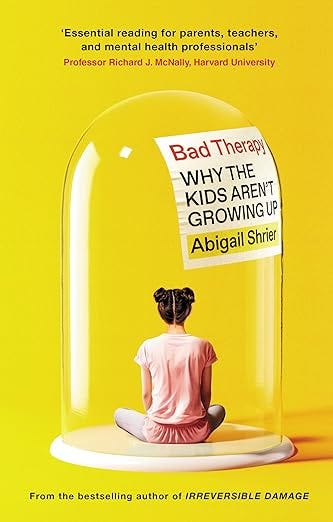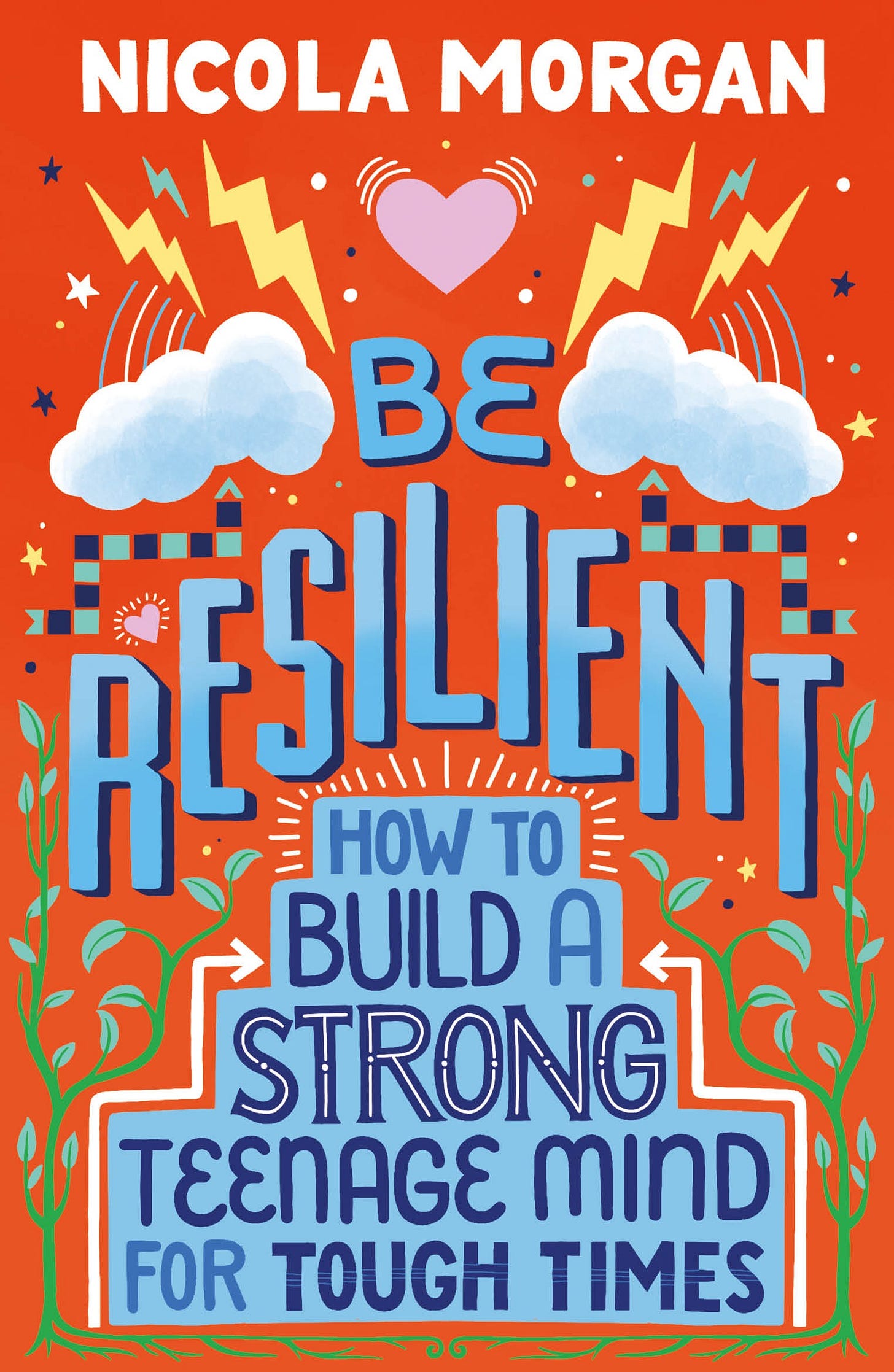Do you worry about the levels of anxiety and distress reported in our young people? How can we not, as caring adults? But do you ever worry that too many of us - parents, teachers, wellness coaches, humans like me who genuinely care about young people - diagnose “conditions” and attach labels too easily? That those labels may not always be helpful and could even be harmful?
I do.
Whether you already have this concern or not, I recommend you read Abigail Shrier’s Bad Therapy. It’s not a soft read. You will either find yourself nodding a lot, as I did (a very lot), or you will hate it and feel offended that she might be talking about you or undermining your strongly held beliefs and practices. I hope you will still read it, test your principles against it and consider that she might be at least partially right and that if she is, we need to listen.
Even if you disagree with some of what she says, you might concede that at least in some cases, she has a point. Don’t let your disagreement with parts of it let you dismiss all of it. I urge you really strongly to open your mind to the possibilities.
She talks about “the diagnosing of ordinary behaviours as pathological” - for example, diagnosing an anxiety disorder when someone is just reasonably anxious about things that are actually scary or diagnosing depression when someone is experiencing natural sadness after loss.
She talks about the tendency by people without expertise to leap to a conclusion of a disorder based on a checklist of symptoms or a totally amateur diagnosis. We’ve all seen this, haven’t we?
She talks about the problem with attaching labels and how those labels can become traps, restricting growth.
And she talks very robustly - and this is for parents above all - about the danger of accommodating minor anxieties, natural aversions and desires for comfort; the weakening effect of helicopter-parenting and the need for children to struggle a bit, to push a bit, not to have everything handed to them on a plate; and the power of authoritative (not authoritarian) parenting, where the child knows what is expected and steps up to achieve it, leading to a feeling of self-worth, success, agency, mastery.
“…the danger of accommodating minor anxieties, natural aversions and desires for comfort; the weakening effect of helicopter-parenting and the need for children to struggle a bit…”
Important disclaimer(s)
She is very clear to say that she is not talking about those who genuinely have a disorder and certainly need and deserve treatment. She does not deny that those people exist and that their experiences are deeply distressing and life-wrecking but she says that many more people do not fall into such categories and are not helped by therapy which inevitably encourages them to ruminate.
I should also point out that this is a book written in and about the US, where therapy is a much bigger industry than in the UK. But I think you will see similarities.
Finally I’d like to remind you that I have a counselling qualification (Diploma in Youth Counselling) but I do not and never will practise as a counsellor or therapist. I believe that counselling is not something that should be done alone but within a practice where there are others to collaborate with and to check in with. It is too important for one person to handle alone. But it does mean that I do understand what therapy is and should be and how it can work.
“How did that make you feel?”
Shrier says is a question that is both asked too often and may cause harm - iatrogenesis (when a treatment creates or worsens a symptom) is something she talks about a lot. Many people will be surprised that “How did that make you feel?” should be a problematic question and at first so was I. I thought this might be something I disagreed with. So I listened more carefully.
It can be an appropriate question but then what do you do with the answer? Do you acknowledge the validity of the emotion and then move on or do you allow too much time to dwell on the emotion and expect the emotion to affect the rest of your day/week/month?
What if actually the person had dealt with whatever it was and doesn’t need to be reminded of how they felt? How they felt was entirely reasonable and the feeling has now faded, or changed, or just settled as “that was then”. The person could be doing something very positive and practical now and not need to ruminate. But the question encourages rumination when rumination might not be what is best at this time. (Therapy encourages rumination but that rumination should be careful and appropriate and not left hanging.)
Shrier is also very against the practice of asking school students to say how they feel at the beginning of the day. Again, it may not be helpful to acknowledge that you feel a bit rubbish when you didn’t need to be reminded and certainly didn’t need to feel that feeling a bit rubbish might affect your whole day. Might it not be better to find something else more positively affirming to say? Something that suggests that they are going to learn a lot, grow, enjoy some things, meet and beat challenges, be good people, help their friends, be part of a class/team/group?
“What is your goal today?” perhaps? (My idea, not Shrier’s.)
There are three groups of people I hope will read Bad Therapy
Parents. I think you’ll find useful reassurance and strong common sense. You might find yourself changing some habits or you might not. If you often “over-accommodate”, you will find helpful guidance about how and why not to.
Teachers - and anyone who works in a school and is not a trained mental health professional. There is a lot for you in this book, to guide you to think carefully about what you say in your classrooms under the umbrella of “social and emotional intelligence”.
Therapists. Many of you will dislike some or all of the things Shrier says but do remember that she’s talking about some therapists, those who say certain things and behave in certain ways. If that’s not you, it’s not you! And, of course, you must continue to do what you believe is best, after thinking through what she’s saying and seeing whether anything speaks to you.
She says much of what I was trying to say in my book Be Resilient. I describe resilience as being about strength, about bouncing back from setbacks and adversity and having the courage to face challenges. But it is more than that: not just being able to weather storms but also to enjoy the calm weather, beautiful days. Resilience is about being able to deal with all of it.
I talk about life being like an ocean and you are a small boat trying to survive on it. You can’t predict bad weather but you can make yourself strong enough to tackle it when it comes. Then you might need to have minor repairs, sheltering in a harbour. But you can’t stay in the harbour forever. That is not living.
“Only strong people can change the world.”
When I was being interviewed around publication of that book, I was asked a question: “But don’t you think we should try to change how the world is rather than having to change ourselves?” No, I don’t. Well, yes, trying to change bad things in the world is a very good aim but actually first you have the task of making yourself strong. Only strong people can change the world.
Your children are stronger than you think. Believe in them. Show them that you believe in them. Believe in yourself.
For all my books, do visit the links on my Books page. I don’t sell them myself but if you use those links, you will be buying from Bookshop.org, which helps independent bookshops AND I get a few pence in commission. Thank you!






Thank you 🙏
Wise words as always